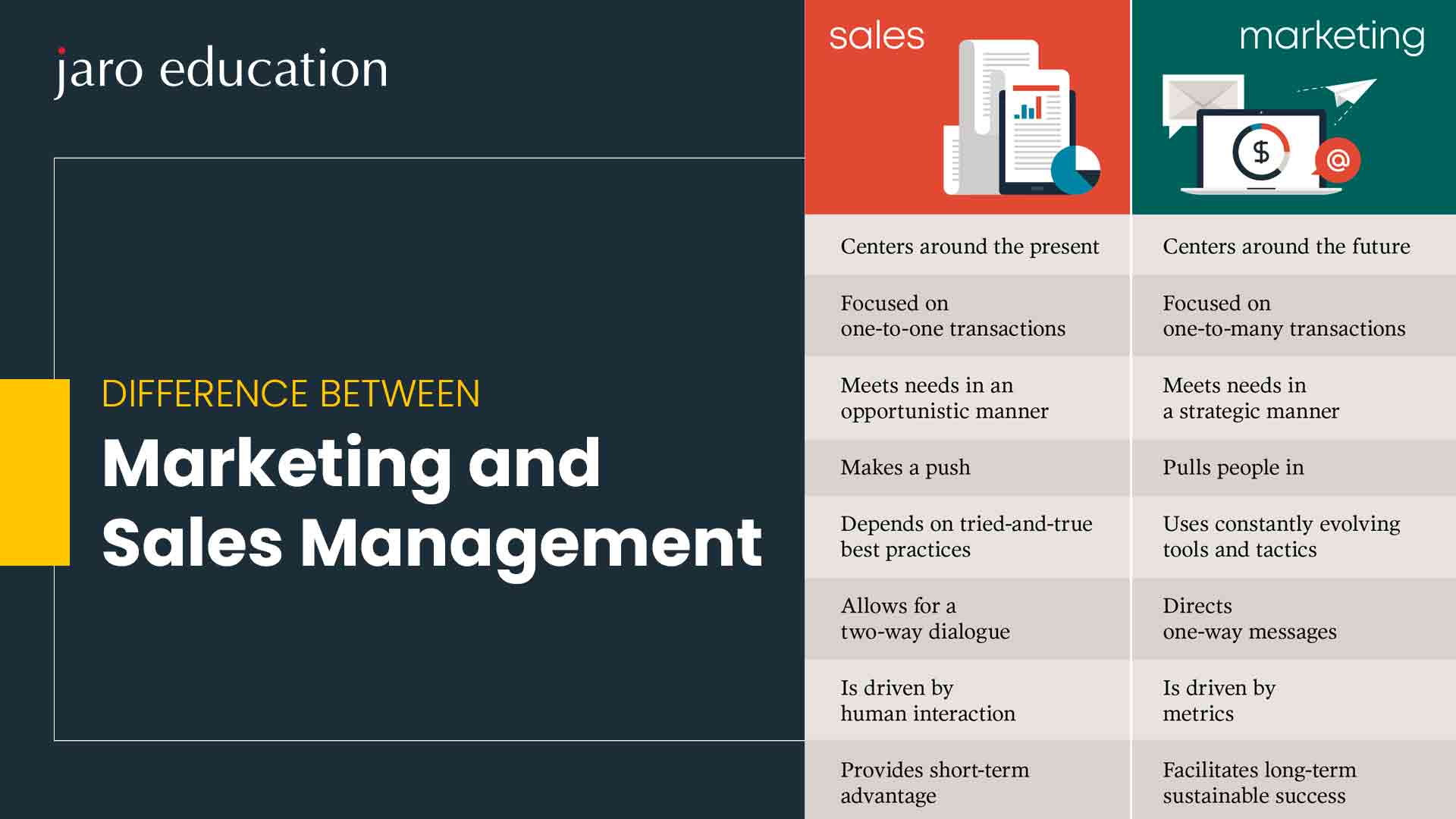An In-Depth Guide to Marketing Management: Understanding Its Essence
Table of Contents

- jaro education
- 26, September 2023
- 3:00 pm
Marketing management is a multidimensional profession that shapes the success and direction of every firm. We will go deeply into the complexities of marketing management within the larger framework of an organisation. Furthermore, we will present a complete grasp of this crucial part of modern business, from defining its purpose to discussing common practices, ideologies, and the value it holds.
A thorough study of marketing management in Dayananda Sagar University’s 17-month Executive MBA programme is important for long-term professional development in marketing.
This programme is designed to suit the specific needs of working professionals as it offers flexible online classes as well as alternate weekend on-campus sessions. It also provides the convenience of remote access, allowing people to participate in these sessions from nearly any location. These features help marketing professionals improve their skill sets and flourish in their corporate responsibilities while keeping their hectic schedules in mind.
What is Marketing Management?
Marketing management can be described as the way of creating, planning, and executing strategies, which helps in achieving broader business objectives. Marketing managers must understand their clients, design effective retention and satisfaction methods, and constantly monitor their progress through KPIs and successes. In simple terms, marketing leadership is concerned with building a brand, crafting a strategic marketing plan for a business, and efficiently organising assets to achieve these objectives.
Key Functions of Marketing Management
Marketing management tasks vary based on the size and nature of a company. However, most organisations have the following functions:
Selling of the Product
Convincing potential customers to make a purchase is a main function of marketing management. It directly impacts the success of marketing campaigns.
Information on market
Gathering data on market sentiment and competitors enables organisations to gain insights and create effective marketing plans.
Buying the product
Gathering data on market sentiment and competitors enables organisations to gain insights and create effective marketing plans.
Buying the product
Decisions regarding price, vendors, quantity, and purpose of purchases are made with a focus on cost reduction or sales enhancement.
Assembling the product
For organisations involved in product assembling, it is important to minimise the wastage of materials, time, and effort.
Storage
Ensuring products are stored in optimal conditions for sale is essential for maintaining product quality and customer satisfaction.
Transportation
Logistics plays a significant role in safely delivering products to customers, especially in the era of online shopping, where the physical product experience occurs upon delivery.
Financing
Managing finances is the lifeblood of marketing activities, ensuring the necessary funds are available for campaigns, lead generation, and product distribution.
Risk Management
Marketing management involves assessing and mitigating risks related to factors such as demand, product spoilage, or unforeseen adverse events.
Key Features of Marketing Management
Let’s look at some of the major characteristics that define marketing management:
Provide Value to Customers
Marketing management is centred on providing value beyond the financial transaction. It helps to create experiences that motivate customers to revisit.
Cater to the Needs of Customers
It guarantees that an organisation’s goals connect with the desires and needs of its customers. This results in ideal product offers and effective sales procedures.
Provide Discount/Offers
Marketing managers create and execute strategies that involve offers that are suited to the needs and desires of targeted audience.
Provides Exchange
The function of offering unmatched value in exchange for money and service after the sale is completed is one that dominates the corporate sector. The turning point between considering buying and actually buying something is the value contributed to the shopping experience.
Importance of Marketing Management
The importance of marketing management cannot be overstated. Here are some key points that underscore its significance:
The customers
Marketing management clarifies the optimal buyers for a product. Through research and strategies, organisations can define target markets and tailor products and experiences accordingly.
Opportunities
Marketing management reveals new or unexplored opportunities that can significantly increase revenue and profitability. It provides access to better data points, especially in this digital era.
Taking Decisions
New Leads
Effective marketing management expands the customer base by identifying potential leads and providing opportunities to increase brand awareness and consumer base.
Employment
Establishing distribution networks, logistics, warehousing, and sales promotion creates employment opportunities across various roles.
Goals of Organisation
A well-executed marketing campaign results in a larger customer base, improved sales, and higher profits. It matches with the organisational objectives and measurable goals.
Effective Marketing Management Process
Several procedures are involved in maximising marketing efforts thoroughly. These processes serve as a base for an effective marketing management:
1. Market and Customer Analysis
This process involves understanding an organisation’s current market position and analysing consumer behaviour. It forms the foundation upon which marketing strategies are built.
2. Development of Strategy, Goals, and Objectives
Marketing supervisors develop plans for company’s growth after completing market and customer research. These approaches set the course for the organisation’s goals.
3. Product Development
Marketing managers play an important role in product development by crafting compelling on-brand messaging that articulates the benefits of a product.
4. Marketing Program Implementation
Once promising marketing programs and campaigns have been identified, it’s essential to deploy the right resources to launch them effectively.
5. Monitoring and Control
Analysing the success of marketing programs and activities is crucial. This process keeps a track of future marketing activities, ensuring continuous improvement.
How to Become a Well-Trained Marketing Professional?
Marketing management is a well-established field with numerous opportunities for education and training. Individuals who want to pursue a career in marketing management have several options:
University Degrees
Many top-tier universities and institutions worldwide offer Bachelor’s and Master’s degrees in marketing management.
Certifications
Various professional organisations offer certifications in marketing management, allowing individuals to enhance their skills and knowledge.
Work Experience
Transitioning into a marketing management role is possible through relevant work experience. As professionals gain industry knowledge, they may naturally progress towards better job positions.
Differences Between Marketing Management and Sales Management
It is essential to distinguish between marketing management and sales management, as they are different but has interrelated roles in an organisation:

*kinesisinc.com
Marketing Management
This focuses on generating leads and creating opportunities through comprehensive strategies and market analysis. This process builds the platform for generating sales and is solely customer-centric.
Sales Management
Sales management is the result of effective marketing management. It involves converting prospects into actual sales and is more product-centric.
Marketing Management vs. Marketing: Understanding the Distinctions
Marketing management and marketing are two closely related but distinct aspects of a successful business strategy. In this brief exploration, we will clarify the differences between these essential components of modern business operations.
Marketing management is a complex procedure that manages every aspect of a marketing initiative, serving as the bridge between strategy and execution. It involves setting measurable objectives, allocating funds, managing teams, conducting data analysis, and exercising leadership. Marketing managers mould the marketing vision to fit with strategic goals, encouraging the expansion of the company. Contrarily, marketing covers a wider range of activities used to spread awareness of a brand or its products across a large audience. It includes engaging directly with customers through a variety of channels, building brand recognition, utilising multi-channel tactics, and coordinating plans with organisational objectives. The main goals of marketing are creating brand awareness and interacting with potential customers through various channels.
Different Ways of Marketing
Marketing management can be classified into several types. Some of them are as follows:
Content Marketing
A great approach for attracting interest in your product is content marketing. It comprises sharing essential information online about your products or business. This can be accomplished through the use of blogs, social media posts, instructions, and videos. The idea is to provide them with the information they need to determine whether or not to purchase from you.
Social Media Marketing
Consider social media marketing to be an online discussion with your customers. It’s also a low-cost technique to get more people interested in what you have to offer. Social networking platforms like Facebook, Instagram, and LinkedIn can all be beneficial in different ways.
Influencer Marketing
Influencer marketing is when someone with a large number of followers promotes your product as they have already established trust with their followers, so recommending your products can help your business flourish.
Email Marketing
Sending helpful emails to people who want to hear from you is what email marketing entails. It’s a terrific method to inform them about new products or remind them of old favourites. Businesses utilise it to increase sales and educate clients through the purchasing process.
Public Relations
PR is the practice of connecting with the media in order to promote your company. It aids in the development of your company’s image and reputation. It all comes down to establishing your reputation and proving that you are an expert in your field.
Marketing via Printing
Here, your brand is promoted through print media such as pamphlets, billboards, and publications. It is nothing but a word-of-mouth on paper. You can promote your brand by reaching a lot of people, or can focus on particular demographic groups.
Postal Service
Paper is delivered via direct mail directly to recipients’ mailboxes. It is analogous to sending emails on paper. Depending on how engaging it is, people might read it.
Television and Radio Marketing
TV and radio are used for the marketing commercials that we usually see or hear. They can be expensive, but if done well, this form of marketing can draw a lot of attention to your company.
Conclusion
Successful firms are built on the strategic foundation of marketing management, which links organisational goals with consumer requirements. We have discussed a number of important issues in this guide that need to be taken into account. Thoughtfulness, patience, creativity, and enthusiasm will be needed during the entire process, from identifying your target demographic to building tactics for customer retention and marketing strategy analysis.










